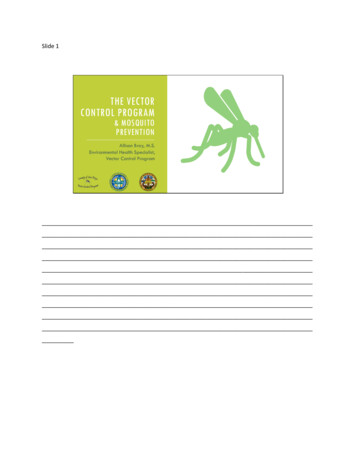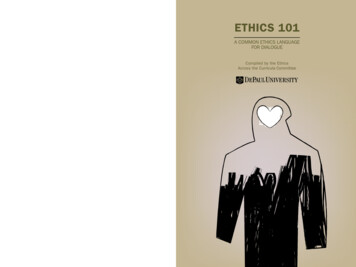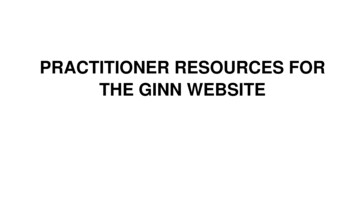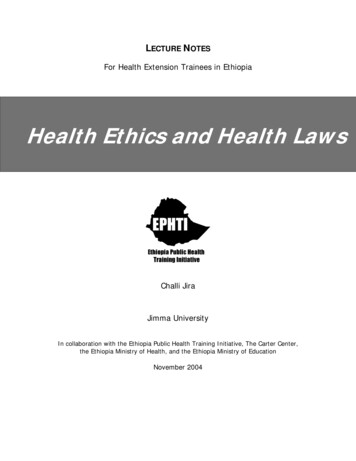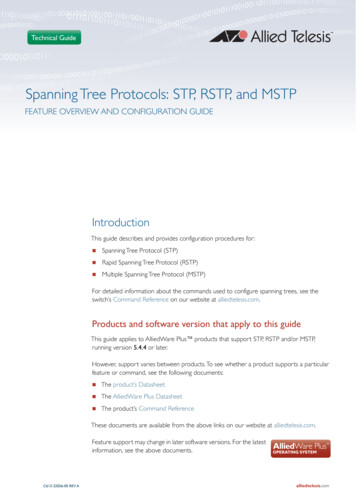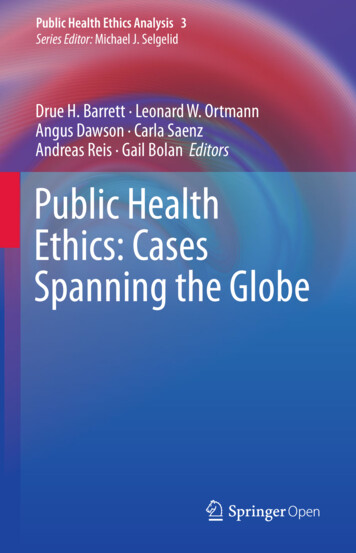
Transcription
Public Health Ethics Analysis 3Series Editor: Michael J. SelgelidDrue H. Barrett · Leonard W. OrtmannAngus Dawson · Carla SaenzAndreas Reis · Gail Bolan EditorsPublic HealthEthics: CasesSpanning the Globe
Public Health Ethics AnalysisVolume 3Edited byMichael J. SelgelidMonash University, Melbourne, Australia
During the 21st Century, public health ethics has become one of the fastest growingsubdisciplines of bioethics. This is the first book series dedicated to the topic ofpublic health ethics. It aims to fill a gap in the existing literature by providingthoroughgoing, book-length treatment of the most important topics in public healthethics—which have otherwise, for the most part, only been partially and/orsporadically addressed in journal articles, book chapters, or sections of volumesconcerned with public health ethics. Books in the series will include coverage ofcentral topics in public health ethics from a plurality of disciplinary perspectivesincluding: philosophy (e.g., both ethics and philosophy of science), political science,history, economics, sociology, anthropology, demographics, law, human rights,epidemiology, and other public health sciences. Blending analytically rigorous andempirically informed analyses, the series will address ethical issues associated withthe concepts, goals, and methods of public health; individual (e.g., ordinary citizens’and public health workers’) decision making and behaviour; and public policy. Interalia, volumes in the series will be dedicated to topics including: health promotion;disease prevention; paternalism and coercive measures; infectious disease; chronicdisease; obesity; smoking and tobacco control; genetics; the environment; publiccommunication/trust; social determinants of health; human rights; and justice. Aprimary priority is to produce volumes on hitherto neglected topics such as ethicalissues associated with public health research and surveillance; vaccination;tuberculosis; malaria; diarrheal disease; lower respiratory infections; drug resistance;chronic disease in developing countries; emergencies/disasters (includingbioterrorism); and public health implications of climate change.More information about this series at http://www.springer.com/series/10067
Drue H. Barrett Leonard W. OrtmannAngus Dawson Carla Saenz Andreas ReisGail BolanEditorsPublic Health Ethics:Cases Spanning the Globe
EditorsDrue H. BarrettOffice of Scientific Integrity, Office of theAssociate Director for Science, Office ofthe DirectorCenters for Disease Control and PreventionAtlanta, GA, USAAngus DawsonCenter for Values, Ethics and the Law inMedicine, Sydney School of Public HealthThe University of SydneySydney, AustraliaAndreas ReisGlobal Health EthicsDepartment of Information, Evidenceand ResearchWorld Health OrganizationGeneva, SwitzerlandLeonard W. OrtmannOffice of Scientific Integrity, Office of theAssociate Director for Science, Office ofthe DirectorCenters for Disease Control and PreventionAtlanta, GA, USACarla SaenzRegional Program on BioethicsOffice of Knowledge Management,Bioethics, and ResearchPan American Health OrganizationWashington, DC, USAGail BolanDivision of STD PreventionNational Center for HIV/AIDS, ViralHepatitis, STD and TB PreventionCenters for Disease Control and PreventionAtlanta, GA, USAISSN 2211-6680ISSN 2211-6699 (electronic)Public Health Ethics AnalysisISBN 978-3-319-23846-3ISBN 978-3-319-23847-0 (eBook)DOI 10.1007/978-3-319-23847-0Library of Congress Control Number: 2015960197 The Editor(s) (if applicable) and The Author(s) 2016. This book is published open access.Open Access This book is distributed under the terms of the Creative Commons AttributionNoncommercial 2.5 License (http://creativecommons.org/licenses/by-nc/2.5/) which permits anynoncommercial use, distribution, and reproduction in any medium, provided the original author(s) andsource are credited.The images or other third party material in this chapter are included in the work’s Creative Commonslicense, unless indicated otherwise in the credit line; if such material is not included in the work’sCreative Commons license and the respective action is not permitted by statutory regulation, users willneed to obtain permission from the license holder to duplicate, adapt or reproduce the material.This work is subject to copyright. All commercial rights are reserved by the Publisher, whether the wholeor part of the material is concerned, specifically the rights of translation, reprinting, reuse of illustrations,recitation, broadcasting, reproduction on microfilms or in any other physical way, and transmission orinformation storage and retrieval, electronic adaptation, computer software, or by similar or dissimilarmethodology now known or hereafter developed.The use of general descriptive names, registered names, trademarks, service marks, etc. in this publicationdoes not imply, even in the absence of a specific statement, that such names are exempt from the relevantprotective laws and regulations and therefore free for general use.The publisher, the authors and the editors are safe to assume that the advice and information in this bookare believed to be true and accurate at the date of publication. Neither the publisher nor the authors or theeditors give a warranty, express or implied, with respect to the material contained herein or for any errorsor omissions that may have been made.Printed on acid-free paperThis Springer imprint is published by Springer NatureThe registered company is Springer International Publishing AG Switzerland
DisclaimerThe contents of this casebook represent the opinions, findings, and conclusions ofthe authors and do not necessarily reflect the official position, views, or policies ofthe editors, the editors’ host institutions, or the authors’ host institutions.v
PrefacePublic health ethics can be seen both as the application of principles and norms toguide the practice of public health and as a process for identifying, analyzing, andresolving ethical issues inherent in the practice of public health. Public health ethicshelps us decide what we should do and why. Although the practice of public healthhas always considered ethical issues, the emergence of public health ethics as adiscipline is relatively new. Although rooted in bioethics and clinical and researchethics, public health ethics has many characteristics that set it apart. The definingcharacteristics are its focus on achieving social goods for populations while respecting individual rights and recognizing the interdependence of people.Currently there are few practical training resources for public health practitioners that consider ethical issues and dilemmas likely to arise in the practice of public health. In public health ethics training, we have found it advantageous to usecases to illustrate how ethical principles can be applied in practical ways to decisionmaking. The use of cases encourages reflection and discussion of ethics, reinforcesbasic ethical concepts through application to concrete examples, highlights practical decision making, allows learners to consider different perspectives, and sensitizes learners to the complex, multidimensional context of issues in public healthpractice. The case-based approach (known as casuistry) contrasts with the theoretical approach to considering moral principles, rules, and theories. By describingscenarios, cases allow the learner to use ethical principles in the context of a realistic situation that sheds light on ethical challenges and illustrates how ethical principles can help in making practical decisions.This casebook comprises a broad range of cases from around the globe to highlight the ethical challenges of public health. For those new to public health ethics,Section I introduces public health ethics. Chapter 1, “Public Health Ethics: GlobalCases, Practice, and Context” by Ortmann and colleagues, summarizes basicconcepts and describes how public health ethics differ from bioethics, clinicalethics, and research ethics. The chapter also includes an approach for conducting anethical analysis in public health. In Chap. 2, “Essential Cases in the Development ofPublic Health Ethics,” Lee, Spector-Bagdady, and Sakhuja highlight importantvii
viiiPrefaceevents that shaped the practice of public health and explain how practitionersaddress and prevent ethical challenges.Section II is organized into chapters that discuss the following public healthtopics: Resource allocation and priority settingDisease prevention and controlChronic disease prevention and health promotionEnvironmental and occupational public healthVulnerability and marginalized populationsInternational collaboration for global public healthPublic health researchWe have invited some of the leading writers and thinkers in public health ethicsto provide an overview of the major ethical considerations associated with eachtopic. The topic overviews offer the authors’ perspectives about applicable ethicaltheories, frameworks, and tools and draw attention to the cases that follow. Thecases are meant to highlight the ethical issues in practice. Each represents the workof authors from around the globe who responded to a solicitation from the U.S.Centers for Disease Control and Prevention. We worked with the authors to ensurethat each case included a concise articulation of a public health situation that raisesethical tensions, challenges, or concerns that require decisions or recommendationsfrom public health officials or practitioners. The cases are presented in a standardformat that includes a background, case description, discussion questions, and references. However, we also allowed for variation in the amount of detail provided ineach section and the approach used to set up the case. Our goal was to include justenough contextual information to orient the reader who is not an expert in the casetopic. We include the case setting, population, or intervention in question, legal orregulatory landscape, and questions to stimulate discussion on core ethical issues.Each case—although fictionalized—is as realistic as possible to reflect the ethicalchallenges that public health practitioners face daily. Sometimes the cases werebased on actual or composite events. In these instances, the case details were modified to exclude identifying information that could be considered private, sensitive,or disputable by others involved in the case.We deliberately did not attempt to provide a resolution or solution for the cases.Often in public health practice, there is no single correct answer. Instead, ethicalanalysis in public health is a process to identify the ethical dimensions of the optionsavailable and to arrive at a decision that is ethically justifiable, through deliberationand consideration of relevant facts, values, and contexts.The cases and other writings in this book represent the opinions, findings, andconclusions of the authors and do not necessarily reflect the official position, views,or policies of the editors, the editors’ host institutions, or the authors’ host institutions. We decided which topic category to place the case in to best distribute thecases across chapters. However, you may note that some cases cross topic areas andcould just as easily have been included in another chapter.
PrefaceixThis casebook is written for public health practitioners, including frontline workers, field epidemiology trainers and trainees, and managers, planners, and decisionmakers with an interest in learning about how to integrate ethical analysis in theirday-to-day public health practice. However, the casebook will also be useful toinstructors in schools of public health and public health students as well as to academic ethicists who can use the book to teach public health ethics and distinguish itfrom clinical and research ethics.Our hope is that the casebook will increase awareness and understanding of public health ethics and the value of ethical analysis in public health practice in all of itsforms. This includes applied public health research; public health policy development, implementation, and evaluation; and public health decision making in nationaland international field settings and training programs. By emphasizing prospectivepractical decision making, rather than just presenting a theoretical academic discussion of ethical principles, we hope this casebook will serve as a useful tool to support instruction, debate, and dialogue about the nature of ethical challengesencountered in public health practice and how to resolve these challenges. We recommend discussing the cases in small groups and using the discussion questions,the ethical framework described in Chap. 1, and the information provided in thetopic area overview sections as a starting place for exploring the ethical issuesreflected in the cases. The ultimate goal of case-based learning is to develop skillsin ethical analysis and decision making in daily public health practice. The ethicalframework provides a convenient tool for putting our ideas into practice.Atlanta, GA, USAAtlanta, GA, USASydney, AustraliaWashington, DC, USAGeneva, SwitzerlandAtlanta, GA, USADrue H. Barrett, PhDLeonard W. Ortmann, PhDAngus Dawson, PhDCarla Saenz, PhDAndreas Reis, MDGail Bolan, MD
ContentsSection IIntroduction to Public Health Ethics1 Public Health Ethics: Global Cases, Practice, and Context .Leonard W. Ortmann, Drue H. Barrett, Carla Saenz,Ruth Gaare Bernheim, Angus Dawson, Jo A. Valentine,and Andreas Reis1.1Introduction .1.2Public Health .1.3Ethics.1.4Public Health Ethics .1.5Ethical Frameworks .1.6A Three-Step Approach to Public Health Decision Making .References .2 Essential Cases in the Development of Public Health Ethics .Lisa M. Lee, Kayte Spector-Bagdady, and Maneesha Sakhuja2.1Introduction .2.2Case Study: Jacobson v. Massachusetts .2.3Case Study: U.S. Public Health Service Research on SexuallyTransmitted Disease: Alabama and Guatemala.2.4Case Study: The New York City A1C Registry.2.5Conclusions and Implications .References .33591927283337373944505455Section II Topics in Public Health Ethics3 Resource Allocation and Priority Setting.Norman Daniels3.1Resource Allocation in Public Health .3.2Collective Lessons from the Cases .3.3Specific Ethical Issues in Resource Allocation .61616265xi
xiiContents3.4Decision-Making Process .References .3.5Case 1: Priority Setting and Crisis of PublicHospitals in Colombia.References .3.6Case 2: Intersection of Public Health and MentalHealth: Meeting Family Needs .References .3.7Case 3: Public-Private Partnerships: Role of CorporateSponsorship in Public Health .References .3.8Case 4: Black-White Infant Mortality: Disparities,Priorities, and Social Justice .References .3.9Case 5: Priority Setting in Health Care: Ethical Issues.References .3.10 Case 6: Critical Care Triage in Pandemics.References .69704 Disease Prevention and Control .Michael J. Selgelid4.1Introduction .4.2Mandatory Treatment and Vaccination .4.3Disease Screening and Surveillance .4.4Stigma .4.5Access to Care.4.6Health Promotion Incentives .4.7Emergency Response .4.8Conclusion .References .4.9Case 1: Mandatory Vaccination in Measles Outbreaks .References .4.10 Case 2: Public Health Approaches to PreventingMother-to-Child HIV Transmission .References .4.11 Case 3: Newborn Bloodspot Screening: Personal Choiceor Public Health Necessity? Storage and Ownershipof Newborn Bloodspots.References .4.12 Case 4: Decoding Public Health Ethics and Inequityin India: A Conditional Cash IncentiveScheme—Janani Suraksha Yojana .References .4.13 Case 5: HIV Criminalization and STDPrevention and Control .References 03107108111111114116119120124
Contentsxiii4.14 Case 6: Ethics of Administering Anthrax Vaccine to Children .References .4.15 Case 7: Non-adherence to Treatment in Patientswith Tuberculosis: A Challenge for Minimalist Ethics .References .4.16 Case 8: Mass Evacuation .References .1251285 Chronic Disease Prevention and Health Promotion .Harald Schmidt5.1Introduction .5.2Individuals .5.3Formal and Informal Health Workers .5.4Governments (At Different Levels) .5.5Corporate Entities .5.6Case Studies .References .5.7Case 1: Municipal Action on Food and BeverageMarketing to Youth .References .5.8Case 2: Obesity Prevention in Children: MediaCampaigns, Stigma, and Ethics.References .5.9Case 3: Obesity Stigma in Vulnerableand Marginalized Groups .References .5.10 Case 4: Water Fluoridation: The Example of Greece .References .5.11 Case 5: The Prohibition of Smoking in PublicPlaces in Bulgaria.References .1376 Environmental and Occupational Public Health .Bruce Jennings6.1Environment and Workplace: Key Venues for Public Health .6.2Population Benefits, Individual Rights, and EthicallyAcceptable Risk .6.3Systems and Power: The Ethical Importanceof Ecological and Social Context .References .6.4Case 1: Assessing Mining’s Impact on HealthEquity in Mongolia .References .6.5Case 2: Exceptions to National MRSA Prevention Policyfor a Medical Resident with Untreatable MRSA Colonization .References 66167170172175177177180183185186190191194
xivContents6.6Case 3: Safe Water Standards and Monitoringof a Well Construction Program .References .6.7Case 4: Implementation of Global Public Health Programsand Threats to Personal Safety .References .1951981992017 Vulnerability and Marginalized Populations.Anthony Wrigley and Angus Dawson7.1Introduction .7.2Different Approaches to the Concept of Vulnerability .7.3Concerns Surrounding Approach (V2): Universal Condition .7.4Concerns Surrounding Approach (V3): Specific Attributes,Contexts, or Groups .7.5Concerns Surrounding Approach (V4):Overarching Concepts .7.6Simplifying the Concept of Vulnerability (V5):The Moral-Marker Approach .References .7.7Case 1: Reducing Sudden Infant Death Syndromein a Culturally Diverse Society: The New Zealand CotDeath Study and National Cot Death Prevention Programme .References .7.8Case 2: Medical Tourism and Surrogate Pregnancy:A Case of Ethical Incoherence .References .7.9Case 3: Compulsory Treatment for Injection Drug Useafter Incarceration .References .7.10 Case 4: Unanticipated Vulnerability: Marginalizingthe Least Visible in Pandemic Planning .References .7.11 Case 5: Can Asylum Seeking Be Managed Ethically? .References .7.12 Case 6: Tuberculosis Screening, Testing, and Treatmentamong Asylum Seekers .References .2038 International Collaboration for Global Public Health .Eric M. Meslin and Ibrahim Garba8.1Introduction .8.2The Rise of Globalization and Global Health .8.3Ethics Frameworks for Global Health.8.4Summary .References .8.5Case 1: The Ethics of HIV Testing Policies .References 30233235239241242246253253256259
ContentsCase 2: Just Allocation of Pre-exposure ProphylaxisDrugs in Sub-Saharan Africa .References .8.7Case 3: Drug Trials in Developing Countries .References .8.8Case 4: Ethical Issues in Responding to InternationalMedication Stock-Outs .References .8.9Case 5: Transmitting Cholera to Haiti.References .8.10 Case 6: Perilous Path to Middle East Peace:The Sanctions Dilemma .References .8.11 Case 7: Advancing Informed Consent and Ethical Standardsin Multinational Health Research .References .xv8.69 Public Health Research .Drue H. Barrett, Leonard W. Ortmann, Natalie Brown,Barbara R. DeCausey, Carla Saenz, and Angus Dawson9.1Introduction .9.2What Is Different About Public Health Research? .9.3Ethical Considerations for Protecting the Publicduring Health Research .9.4How Ethical Challenges Can Arise in Public HealthResearch: Lessons Learned from Cases .9.5Conclusions .References .9.6Case 1: To Reveal or Not to Reveal PotentiallyHarmful Findings: A Dilemma for Public Health Research .References .9.7Case 2: Ethical Challenges in Impoverished Communities:Seeking Informed Consent in a Palestinian RefugeeCamp in Lebanon .References .9.8Case 3: Improving Review Quality and Efficiencyof Research Ethics Committees to Enhance PublicHealth Practice in Africa .References .9.9Case 4: Internet-Based HIV/AIDS Educationand Prevention Programs in Vulnerable Populations:Black Men Who Have Sex with Men.References .
Public health ethics can be seen both as the application of principles and norms to guide the practice of public health and as a process for identifying, analyzing, and resolving ethical issues inherent in the practice of public health. Public health ethics helps us decide what we should do and why. Although the practice of public health


